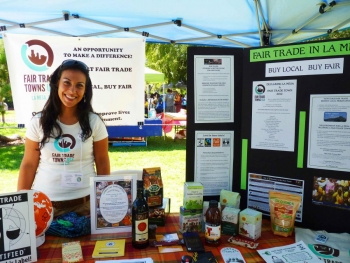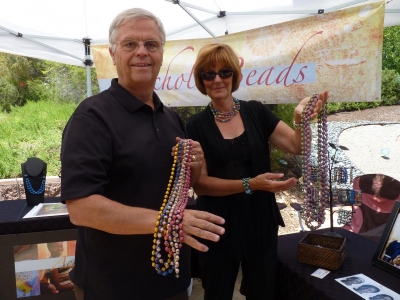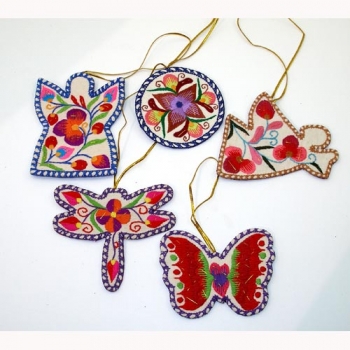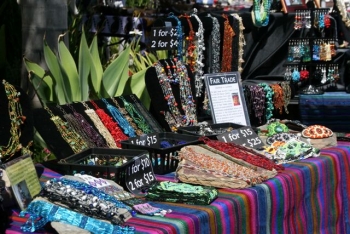"There are an estimated 1.4 billion people living in poverty and existing on less than $1.25 a day...Good news is that you can do something about this!" --La Mesa Fair Trade

October 10, 2011 (La Mesa)—On Tuesday, La Mesa’s City Council will consider a resolution to declare the community a “Fair Trade"city.
About two dozen cities nationwide have already been designated "Fair Trade Towns USA" including Chicago, Boston, San Francisco and other major cities as well as smaller communities such as Taos, New Mexico and Burlington, Vermont. Supporters have established a website at http://lamesafairtrade.blogspot.com.
“Stop and ponder the relationship we have with the unseen producers, artisans and farmers across the globe - the people who sewed your shirt, picked your coffee beans, crafted your jewelry, cultivated your cocoa and picked your morning banana,” Fair Trade La Mesa’s blog site states. “Do you think they received a fair wage, had the privilege of decent working conditions or could provide their children with an education? Unfortunately, the answer in most cases is no. There are an estimated 1.4 billion people living in poverty and existing on less than $1.25 per day.”
Moreover, the website asks consumers, “Did you know that 15,000 children aged 9 to 12 in the Ivory Coast alone have been sold into forced labor on conventional cotton, coffee, and cocoa plantations and that 284,000 children in the Ivory Coast, Ghana, Nigeria and Cameroon are working in hazardous tasks on conventional cocoa farms? Good news is that you can do something about this!”

The goal of the “fair trade” movement seeks to give consumers a way to be assure that products they purchased are made under conditions that provide fair, living wages and that meet basic environmental standards. By creating markets directly between local merchants and artisans, craftspeople, and farmers, fair trade eliminates middlemen and empowers people in some third-world countries to escape poverty and sweatshop conditions, while providing consumers with additional shopping choices.
Take for example Aicholi beads, made by women from the Aicholi tribe in Africa. Displaced by war, the women were working in a rock quarry for a dollar a day--until Jamul resident James Pearson noticed the colorful beads they wore while traveling in Uganda. He offered to bring the beads, made from recycled magazines but resembling colorful ceramics, to America and sell them.
"Now all the women are earning enough to support their families with wages equivalent to a school teacher," he told ECM last summer. The beads are sold in gift stores and galleries across the U.S., also enabling Pearson to have a thriving business while helping lift women out of poverty overseas.
To qualify as a Fair Trade town, a city must meet several requirements. Council must pass a resolution. At least one store for every 5,000 residents (12 stores in La Mesa, which has a population of 60,000) must agree to sell at least two Fair Trade-certified products. Fair Trade products, such as coffee and tea, should be served at some functions held within the city, such as meetings of local governments, schools, hospitals or churches.

Already, La Mesa has met the 12-store requirement, with at least 14 shops and stores currently carrying Fair Trade products. Those include Albertsons, All Things Bright and British, Cosmos Coffee Café, Cost Plus World Market, Henry’s Market, La Mesa Bistro & Bakery, Marcella June’s Coffee Lounge, Reader’s Inc. a Children’s Bookstore, @Spacebar Internet Café, Swami’s Café, Starbucks, Trader Joe’s, Vic’s Deli & Café, and The Vitamin Shoppe.
Fair Trade products include food items such as cocoa and spices, home décor products such as hand-crafted table linens and tapestries, jewelry and apparel, body care items, games and crafts.
Mayor Art Madrid and Councilmember Ruth Sterling placed the item on the agenda at the request of La Mesa residents Nancy Ryan and Anne Pacheco.
The draft resolution expresses civic support for “sustainable and equitable commerce and economic development” and calls the Fair Trade measure “an innovative market strategy that promotes fair labor practices and healthy, safe work environments through the production of food and other food.” Other goals include helping consumers “be aware of the impact that our consumption has on the communities that produce the goods we purchase” and “supporting our local economy by purchasing locally and ethically produced goods and services.”
Not everyone backs the Fair Trade La Mesa resolution. La Mesa resident Scott Kidwell calls the measure “Fair Trade folly” in an e-mail sent to ECM and other media. Kidwell opposes the “use of city resources to favor or encourage certain legal business over other legal business” and argues that state law requires that “public funds (resources) must be for public purposes.”
Supporters say passing the measure will bring “significant” benefit to La Mesa, however, including national publicity and recognition. Stores carrying Fair Trade products will received listings on websites, articles, and a map. Letters have been sent to pastors of churches to encourage support. Additional publicity, including a radio campaign, is planned along with outreach to community groups, businesses and service clubs. Increased business for La Mesa could boost tax revenues that presumably could be used for the public good.
Kidwell also objects to seeing local government support patronage of businesses that “support certain social causes and/or political positions” and voices concern that the measure favors some businesses over others. He argues that “proponents should work to sell the private business community on their ideas and demonstrate the superiority of their agenda through privately funded marketing to consumers.”
There are some precedents for La Mesa to support programs that may benefit some businesses more than others. Currently, the city already promotes festivals that boost business for downtown village merchants and a farmer’s market that encourages people to buy from local farmers and/or support organic agriculture.

How big a difference can the Fair Trade movement make in lives of people producing the products sold?
According to Fair Trade International, Fair Trade has now achieved significant market share in many product categories in the 70 countries where Fair Trade products are sold. In some national markets Fairtrade accounts for between 20-50% of market share in certain products.
There are now 827 Fairtrade certified producer organizations in 58 producing countries, representing over 1.2 million farmers and workers. In addition to other benefits, approximately 52 million euros was distributed to communities in 2009 for use in community development. Including families and dependents, Fair Trade International estimates that 6 million people directly benefit from Fair Trade. The sales of Fair Trade certified products grew 15% between 2008-2009. In 2009, Fair Trade certified sales amounted to approximately 3.4 billion euros worldwide.
Moreover, Fair Trade premiums help producers to improve the quality of their lives. “It is paid on top of the agreed Fair Trade price, and producers decide democratically how to use it,” Fair Trade International’s website states. “Typically they invest it in education, healthcare, farm improvements or processing facilities to increase income.”

The Fair Trade Town USA resolution will be considered by the La Mesa City Council on Tuesday, October 11 at 4 p.m. at La Mesa City Hall.
La Mesa Fair Trade is also hosting a Fair Trade Gift Fair on October 16 at St. Martin of Tours Catholic Church, 7710 El Cajon Blvd., in La Mesa. The public is invited to this free event, where free trade holiday gift items will be available for purchase from 8 a.m. to 1 p.m. For more information, visit http://lamesafairtrade.blogspot.com/.













Recent comments